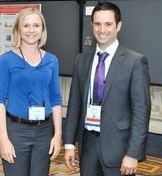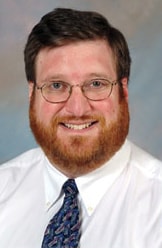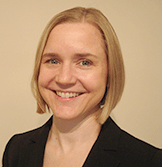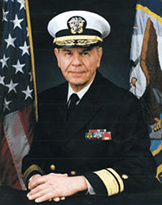For more than 35 years, the CMSC has been applying research findings in specific areas of MS care to improve patient outcomes. With a network of more than 200 North American CMSC Member Centers, the CMSC is positioned for collaborative research opportunities.
While this alone would be a significant accomplishment, experts agree that further research is necessary to gain a deeper understanding of fundamental MS channels, such as:
- Quality of Life outcomes;
- Impact of Comprehensive Care;
- Neuroimaging;
- Immunology;
- Symptom management;
- Physical therapy/rehabilitation;
- Psychosocial issues/depression.
CMSC Collaborative Research Grants
Named Study Grant Awards to Recognize Excellence and Potential for CMSC Pilot Study Research Opportunities
 A Research Study Grant Award, named in honor of John F. Kurtzke, MD, has been established and awarded to Gabriele De Luca, MD, PhD, in 2010/2011 and Jennifer Graves, MD, PhD in 2012. Dr Kurtzke is widely recognized for his contributions to epidemiological and multiple sclerosis clinical research.
A Research Study Grant Award, named in honor of John F. Kurtzke, MD, has been established and awarded to Gabriele De Luca, MD, PhD, in 2010/2011 and Jennifer Graves, MD, PhD in 2012. Dr Kurtzke is widely recognized for his contributions to epidemiological and multiple sclerosis clinical research.
This research award is funded through an FCMSC grant by Questcor Pharmaceuticals, Inc.
 Steven R. Schwid Memorial Study Grant Award
Steven R. Schwid Memorial Study Grant Award
Supported through an FCMSC grant from Teva Neuroscience
Dr. Schwid, a CMSC member noted for his contributions to neurology research and multiple sclerosis trial design, is honored through an annual CMSC research study grant award. Awards for 2010-2011 will be made by the CMSC Research Committee in late 2010.
The first CMSC study grant award in honor of the late Steven R. Schwid, MD, FAAN, was presented to Susan Bennett, PT, EdD, NCS, MSCS, Clinical Associate Professor, Departments of Rehabilitation Science and Neurology at the University of Buffalo, for her group’s submission, “Validity, Reliability and Sensitivity of Three Gait Measures for MS.”
The FCMSC also collaborated with the CMSC in funding a second 2009 study grant, “Exploring the Potential of Nintendo Wii to Promote Exercise in Persons with MS”, submitted by Marcia Finlayson, PhD, OT(C), OTR/L, from the University of Illinois, Chicago. This is an innovative project using 21st century technology that will assess the participation and patient outcomes of self-directed activity and exercise in people with multiple sclerosis. It will build upon previous evidence that supports the benefit of this strategy in older adults.
CMSC Pilot Research Awards funded by the Foundation of the CMSC
A pilot single-blind randomized controlled trial to evaluate the safety and feasibility of rhythmic auditory stimulation for gait traning in persons with Multiple Sclerosis
FCMSC Steven R. Schwid Memorial Pilot Grant Award
Pilot Randomized Control Trial of Mindfulness-Based Cognitive Therapy for the Treatment of Pain Perception in Multiple Sclerosis
Francois Bethoux, MD, Mellen Center for MS/ Cleveland Clinic
John F. Kurtzke, MD Pilot Grant Award
Monitoring exertion-induced changes in gait parameters in patients with relapsing-remitting MS
Joshua Sandry Ph.D., Kessler Foundation Research Center
FCMSC Kenneth P. Johnson Pilot Grant Award
Hippocampal involvement in working and long-term memory to understand memory impairment in multiple sclerosis
Helen Genova, Ph.D., Kessler Foundation Research Center
Hillel S. Panitch Pilot Grant Award
Investigation of Social Cognition in Progressive MS
FCMSC Steven R. Schwid Memorial Pilot Grant Award
Passive Continuous, In-Home Symptom and Gait Measure for Patients with Multiple Sclerosis- A feasibility study
John R Rinker, II, MD, VA Medical Center, Birmingham
John F. Kurtzke, MD Pilot Grant Award
The spectrum of psychiatric disease among veterans with multiple sclerosis: Prevalence and utilization of mental health services
Tanuja Chitnis, MD, Partners MS Center, Brigham and Women’s Hospital
FCMSC Kenneth P. Johnson Pilot Grant Award
Piloting a handheld platform to investigate changes in quality of life (QOL), treatment satisfaction and adherence associated with initiation of oral DMTs
Sonya Kim, PhD, CRC, NYU School of Medicine – Department of Rehabilitation Medicine
Hillel S. Panitch Pilot Grant Award
A Qualitative Study of Posttraumatic Growth in Partners of Individuals with Multiple Sclerosis
FCMSC Steven R. Schwid Memorial Pilot Grant Award
The Effects of Yoga Practice on Walking and Balance in Ambulatory Multiple Sclerosis Patients
Eric Chamot, MD, MS, PhD, University of Alabama at Birmingham
John F. Kurtzke, MD Pilot Grant Award
Interpretation of Changes in IRT scored version of NARCOMS performance scales
Miho Asano, PhD, School of Rehabilitation Therapy, Queen’s University
FCMSC Kenneth P. Johnson Pilot Grant Award
The use of rehabilitation services in post-relapse management in Multiple Sclerosis
Tanuja Chitnis, MD, Brigham and Women’s Hospital, Harvard Medical School
Hillel S. Panitch Pilot Grant Award
Long term patient reported outcomes in pediatric onset Multiple Sclerosis
FCMSC Steven R. Schwid Memorial Pilot Grant Award
Remediation of Emotional Processing Deficits in MS: A Pilot Study
Terry Lee-Wilk, PhD, VA Maryland Health Care System
John F. Kurtzke, MD Pilot Grant Award
A Cognitive Telerehabilitation Initiative for Veterans with MS
Jonathan Cook, MD, Columbia University
FCMSC Kenneth P. Johnson Pilot Grant Award
A Cognitive Telerehabilitation Initiative for Veterans with MS
Dagmar Amtmann, PhD, University of Washington
Hillel S. Panitch Pilot Grant Award
New Ways to Measure Sleep of Individuals Living with MS
FCMSC Steven R. Schwid Memorial Pilot Grant Award
Developing a Clinical Reasoning Algorithm to Guide MS Fatigue Rehabilitation Interventions
James Mariott, University of Manitoba Health Sciences Centre
John F. Kurtzke, MD Pilot Grant Award
Project FARMS: Fall Risk Reduction in MS
Hillel S. Panitch Pilot Grant Award
MS and Neuromyelitis Optica in Special Populations in Manitoba
FCMSC Steven R. Schwid Memorial Pilot Grant Award
Development of a Comprehensive Global MS Symptom Assessment Using Modern Measurement Theory.
This annual study grant award, honoring the late Steven R. Schwid, MD is funded by Teva Neuroscience.
Anne H. Cross, MD, Washington University, St. Louis
John F. Kurtzke, MD Pilot Grant Award
Role of Adiponectin in MS and its Animal Model
Pilot research study funded through FCMSC by Questcor Pharmaceuticals
The CMSC Research program continues to sustain the mission of the CMSC which is to promote the best and latest in care for Multiple Sclerosis.
The Foundation of the CMSC salutes the supporters of Research Programs:
- Bayer HealthCare Pharmaceuticals, Inc
- EMD Serono, Inc.
- Neurologic Disease Foundation
- Questcor Pharmaceuticals
-
Teva Neuroscience
With your help and support of the Foundation of the CMSC, we can ensure that future generations of people with MS will receive the quality healthcare they need and deserve.
Consensus Conferences
Since 2008, the Foundation of the CMSC has raised funds to support CMSC professional Consensus Conferences examining current and best practice management issues, advances in research, and potential educational needs for MS research and clinical care.
FCMSC gratefully acknowledges grants in partial support of these conferences and the dissemination of results through publications or educational programs from the following supporters:
- Acorda Therapeutics
- Allergan
- Bayer HealthCare Pharmaceuticals, Inc
- Biogen Idec
- Genzyme
- Questcor Pharmaceuticals, Inc
- Teva Neuroscience
- XenoPort
Fellowship Projects
ADDRESSING THE NEXT DECADE’S APPLICATION OF MS RESEARCH CONTINUES TO BE ONE OF THE MOST REWARDING AREAS FOR FOUNDATION FUNDING. TWO DIFFERENT FELLOWSHIP PROJECTS MAY HELP TO UNLOCK ANSWERS TO WHO MS STRIKES AND WHY.
AANF-CMSC Kurtzke MS Clinician-Scientist Fellowship: A CMSC and American Academy of Neurology Foundation Collaborative Award.
In a letter to the Foundation, Dr. De Luca commented “…Funding support through the FCMSC has been crucial to the pursuit of my dream to be a clinician-scientist. The John F. Kurtzke Clinician-Scientist Development Award has enabled me to undertake research focused on the relationship between genetics and pathology in MS.” He added, “Through developing a better understanding of the pathogenesis of MS, this research work has the potential to influence MS care by guiding the development of therapies aimed at halting the devastating consequences of the disease.” — Gabriele C. DeLuca, MD, PhD.
 Jennifer Graves, MD, PhD, University of California at San Francisco, has been selected as the recipient of a newly funded FCMSC/CMSC MS Clinician-Scientist Development Fellowship. Supported by the Foundation through a grant from Novartis Pharmaceuticals Corporation, Dr. Graves will begin her 2012-2014 Fellowship to investigate genetic susceptibility factors in pediatric MS and the role that genetic burden may play in early onset of symptoms. Dr. Graves remarks, “I am very excited and highly motivated to be embarking on a career in MS research during this pivotal time of advances in bioscience technology, and hope to bring to the bedside diagnostic and prognostic tools to help my patients receive the best treatments possible.”
Jennifer Graves, MD, PhD, University of California at San Francisco, has been selected as the recipient of a newly funded FCMSC/CMSC MS Clinician-Scientist Development Fellowship. Supported by the Foundation through a grant from Novartis Pharmaceuticals Corporation, Dr. Graves will begin her 2012-2014 Fellowship to investigate genetic susceptibility factors in pediatric MS and the role that genetic burden may play in early onset of symptoms. Dr. Graves remarks, “I am very excited and highly motivated to be embarking on a career in MS research during this pivotal time of advances in bioscience technology, and hope to bring to the bedside diagnostic and prognostic tools to help my patients receive the best treatments possible.”
 The Consortium of Multiple Sclerosis Centers (CMSC) and the American Academy of Neurology Foundation (AANF) have awarded the first John F. Kurtzke, MD, FAAN, Clinician-Scientist Development Three-Year Award in MS to Gabriele De Luca, MD, PhD. This prestigious Fellowship award is supported by funding from the AANF as well as funding through the Foundation of the CMSC to honor the life-long contributions of Dr. Kurtzke, and to inspire new MS healthcare professionals to follow a career path in MS research and clinical care.
The Consortium of Multiple Sclerosis Centers (CMSC) and the American Academy of Neurology Foundation (AANF) have awarded the first John F. Kurtzke, MD, FAAN, Clinician-Scientist Development Three-Year Award in MS to Gabriele De Luca, MD, PhD. This prestigious Fellowship award is supported by funding from the AANF as well as funding through the Foundation of the CMSC to honor the life-long contributions of Dr. Kurtzke, and to inspire new MS healthcare professionals to follow a career path in MS research and clinical care.
Dr. De Luca began work on his research project, “Genetic-Pathologic Correlations in Multiple Sclerosis,” under the mentorship of Dr. George Ebers at the University of Oxford, in July, 2010. Dr. De Luca, formerly Chief Neurology Resident at the Mayo Clinic, recently was awarded the Waldman Prize for excellence in clinical neurology by the Mayo Clinic.
This three-year Fellowship Award is supported in part by grants from Bayer HealthCare Pharmaceuticals, Inc., EMD Serono, Inc., Neurologic Disease Foundation, Questcor Pharmaceuticals Inc., and Teva Neuroscience. The Foundation of the CMSC continues to seek additional funding, and hopes to continue long-term support of this special award.
 John F. Kurtzke, MD, FAAN, has had a long and distinguished career in the field of neurology and neuroepidemiology, as Chief of the Neurology Service at the Veterans’ Affairs (VA) Medical Centers in Coatesville, Pennsylvania and Washington D.C. A Navy veteran of World War II, he attained the rank of Rear Admiral in the Medical Corps of the U.S. Naval Reserve. Dr. Kurtzke served as Professor of Neurology at Georgetown University in Washington D.C., where he has been a faculty member since 1963 and is currently Professor Emeritus. Since 1992, he has also served as Distinguished Professor of Neurology at the F. Edward Herbert School of Medicine of the Uniformed Services University of Healthcare in Bethesda, MD. Among his many personal contributions to MS and epidemiological research, one very notable tool with which all MS researcher are familiar is the Kurtzke Expanded Disability Status Scale (EDSS), one of the most commonly used clinical measures of MS progression.
John F. Kurtzke, MD, FAAN, has had a long and distinguished career in the field of neurology and neuroepidemiology, as Chief of the Neurology Service at the Veterans’ Affairs (VA) Medical Centers in Coatesville, Pennsylvania and Washington D.C. A Navy veteran of World War II, he attained the rank of Rear Admiral in the Medical Corps of the U.S. Naval Reserve. Dr. Kurtzke served as Professor of Neurology at Georgetown University in Washington D.C., where he has been a faculty member since 1963 and is currently Professor Emeritus. Since 1992, he has also served as Distinguished Professor of Neurology at the F. Edward Herbert School of Medicine of the Uniformed Services University of Healthcare in Bethesda, MD. Among his many personal contributions to MS and epidemiological research, one very notable tool with which all MS researcher are familiar is the Kurtzke Expanded Disability Status Scale (EDSS), one of the most commonly used clinical measures of MS progression.
June Halper, Executive Director of the CMSC commented, “We are so proud to encourage the next generation to continue the important work Dr. Kurtzke has established.”


